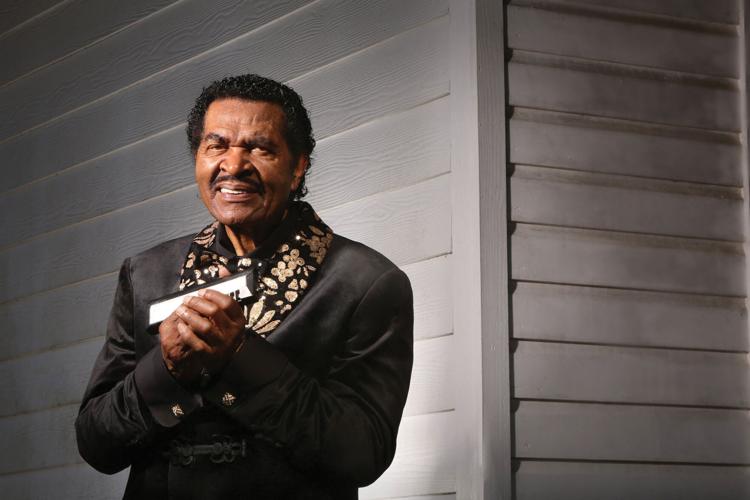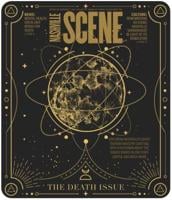
The Manhattans featuring Gerald Alston
For more than 20 years, the Jefferson Street Jazz and Blues Festival has been a much-anticipated highlight of the summer and a North Nashville community staple. Even the 2020 pandemic couldn’t stop it: That year, the festival went virtual. The celebration returned in full glory last year, with lauded R&B ensemble After 7 headlining the daylong event. It was held on Fisk University’s campus, which was even more appropriate as all ticket proceeds went to the Fisk Jubilee Singers and their 150th anniversary fundraising campaign.
This year, the fest returns to Fisk University and gets underway Saturday evening at 5 — and it will be no less of a gala spectacle. This time, the beneficiary of proceeds will be the Jefferson Street United Merchants Partnership, aka JUMP. The longstanding community nonprofit, whose many projects include organizing the festival, is focused on driving economic development and strengthening public programs in North Nashville.
This year’s lineup includes storied R&B vocal group The Manhattans, which was founded in the mid-1960s in Jersey City. The Recording Industry Association of America introduced its platinum certification, marking 1 million sales of a given title, in 1976 — and The Manhattans were given the second one awarded for their soulful hit single “Kiss and Say Goodbye.” In the 2000s, two different iterations of the group began touring. The one featuring Gerald Alston — who joined The Manhattans in 1970 and is the last surviving member of the ensemble at its commercial peak — appears Saturday. Also on the bill are popular Nashville R&B dance band Higher Ground and renowned saxophonist Mike Phillips, who’s played with such stars as Prince, Jill Scott and Stevie Wonder, and who just released a new self-titled album.

Bobby Rush
The fest’s headliner is 88-year-old Bobby Rush — a Chicago blues legend, on par with Buddy Guy as one of the genre’s greatest survivors. Rush grew up in Louisiana and Arkansas during the height of the Jim Crow era, and learned to make music on a single-string diddley bow and a harmonica. In his teens, the young man born Emmett Ellis Jr. began performing under the name Bobby Rush in juke joints and dirt-floor clubs. He made friends with such fellow future immortals as Elmore James, Muddy Waters, Howlin’ Wolf, Albert King and Rufus Thomas.
Rush embraced the blues wholeheartedly, and through relentless touring that led him to settle in Chicago for an extended period, he developed a stage presence and show that have remained enormously popular among the core blues faithful. As a bandleader, his ranks once included both legendary guitarists Luther Allison and Freddie King; Rush became an excellent harmonica soloist and exuberant vocalist. He is a master storyteller, regaling audiences with tales that range from bawdy to poignant and humorous to insightful — sometimes all at once. Depending on the venue, his stage show ranges from family-friendly to X-rated.
“It’s about what I’m singing,” Rush recently told the Lincoln Journal-Star. “It’s not about what I’m playing. … It’s a gift God gave me. It’s like Martin Luther King, he was a great preacher. But there were lots of guys like him. He was just a guy who delivered. I try to make sure I deliver.”
He has led an extremely colorful life, if frequently a difficult one, summarized in his engaging autobiography I Ain’t Studdin’ Ya: My American Blues Story. Despite the entertaining skill Rush developed from a young age, his career evolved slowly. He didn’t cut his first single “Someday” until 1964. It took until 1971 to have a national hit, “Chicken Heads” — of which he recently recorded four distinctive new versions for a 50th anniversary release — and until 1979 to release his first full album, Rush Hour. “Sue,” the title track from his second album, became his signature hit circa 1983, and helped solidify his reputation as “King of the Chitlin’ Circuit.”
After several nominations, he finally took home a Grammy for his 2016 electric blues record Porcupine Meat, and another for his 2020 acoustic album Rawer Than Raw. It took immense perseverance, but people beyond the most clued-in of blues and soul aficionados have finally recognized the contributions Rush has been making for seven decades.






